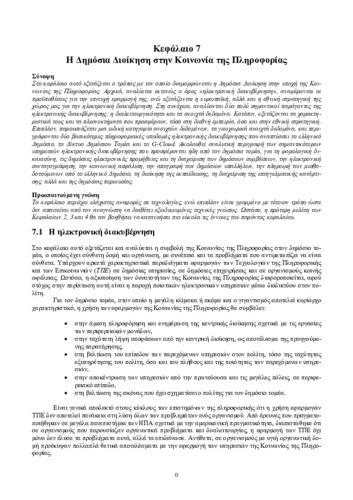| Title Details: | |
|
Public administration in the Information Society |
|
| Authors: |
Paraskevas, Michail |
| Reviewer: |
Syrmakesis, Spyros |
| Subject: | ENGINEERING AND TECHNOLOGY > TECHNOLOGICAL SCIENCES AND ENGINEERING > TELECOMMUNICATIONS ENGINEERING AND TECHNOLOGY > INTERNET AND APPLICATIONS ENGINEERING AND TECHNOLOGY > TECHNOLOGICAL SCIENCES AND ENGINEERING > TELECOMMUNICATIONS ENGINEERING AND TECHNOLOGY > WEB TECHNOLOGIES LAW AND SOCIAL SCIENCES > POLITICAL SCIENCES > FIELDS OF POLICY > POLICY ON TECHNOLOGY LAW AND SOCIAL SCIENCES > POLITICAL SCIENCES > FIELDS OF POLICY > E-GOVERNANCE |
| Keywords: |
Information Society
Internet E-government Interoperability Public Open Data E-goverment Framework Public Geodata Public Sector Network |
| Description: | |
| Abstract: |
This chapter focuses on the issue of e-governance, particularly on issues such as:
• The e-government, e-government maturity levels and the factors for the successful transition to e-government • The European Union Strategy for eGovernment • eGovernment in Greece • Interoperability and open data in eGovernment • The international experience and national policy on open public data • Public geospatial data and services • The basic information infrastructures in Greek public sector (Public Sector Network and central computing infrastructure) • The main government electronic services (for fiscal justice, for public e-procurement and procurement management for electronic prescribing, on social security, on the census of civil servants, for the payment of payroll of the Greek government, for the administration of education on the management of vocational training and the management of publicly owned). |
| Table of Contents: |
7.1 e-Government
7.1.1 Definition of eGovernment 7.1.2 Levels of maturity of eGovernment 7.1.3 Factors successful transition to e-government 7.1.4 European Union Strategy for eGovernment 7.1.5 eGovernment in Greece 7.1.6 Index Development of E-Governance 7.2 Interoperability and open data in eGovernment 7.2.1 Interoperability Definition 7.2.2 Interoperability Benefits 7.2.3 The practical interoperability framework 7.2.4 Open public data 7.2.5 International experience in open public data 7.2.6 National policy for open public data 7.2.7 Public geospatial data and services 7.3 Information infrastructure of Greek public sector 7.3.1 Public Sector Network 7.3.2 Centralized computing infrastructures 7.4 Government online services 7.4.1 For fiscal justice 7.4.2 For public e-procurement and procurement management 7.4.3 For the electronic prescribing 7.4.4 For Social Security 7.4.5 For the census of civil servants 7.4.6 For the payment of payroll of the Greek government 7.4.7 For the administration of education 7.4.8 For management training 7.4.9 To manage the assets of the State 7.5 References and Bibliography 7.5.1 Reference 7.5.2 Bibliography 7.6 Evaluation Criteria |
| Linguistic Editors: |
Xifara, Foteini |
| Technical Editors: |
Tsemperlidou, Melpomeni |
| Graphic Editors: |
Stasinou, Stavroula |
| Type: |
Chapter |
| Creation Date: | 15-12-2015 |
| Item Details: | |
| License: |
http://creativecommons.org/licenses/by-nc-sa/3.0/gr |
| Handle | http://hdl.handle.net/11419/412 |
| Bibliographic Reference: | Paraskevas, M. (2015). Public administration in the Information Society [Chapter]. In Paraskevas, M., Asimakopoulos, G., & Triantafyllou, V. 2015. Information Society [Undergraduate textbook]. Kallipos, Open Academic Editions. https://hdl.handle.net/11419/412 |
| Language: |
Greek |
| Consists of: |
1. Public administration in the Information Society: Multiple choice questions 2. Public administration in the Information Society: Multiple choice questions 3. Levels of maturity of eGovernment |
| Is Part of: |
Information Society |
| Technical Requirement: |
For the use of the object an ePub reader is required. |
| Number of pages |
40 |
| Version: |
Version 1.0 |
| Publication Origin: |
Kallipos, Open Academic Editions |


